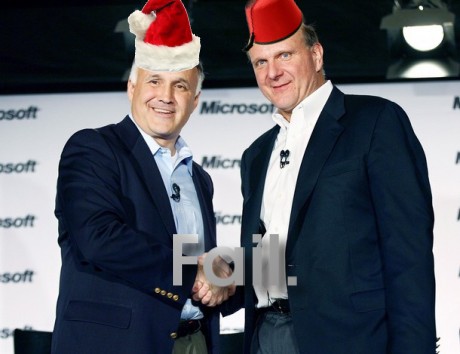

THE problem with software patents is being realised by many news avenues, even the 'Microsoft press' which at least raises questions in a new column stating: "I’m struggling with my feelings about software patents. Although software patents might not seem directly related to your career as a SQL Server professional, software and technology are the bedrock of everything we do and that SQL Server is based on. The future direction of software and patents has the potential to have a profound affect your life and career. Every technology professional should be exploring this topic and forming your own opinions so that you can participate in shaping the future of this debate. (I encourage you to make those opinions known to your elected officials.) Aggressive use of software patents, often on questionable claims, is beginning to have a negative impact on the technology business."
"The general premise was, as both companies had software patents they could work together to exclude the competition, mainly Red Hat."It is rather apparent that Microsoft and patent lawyers are not interested in the benefit to their surroundings. It is very much the opposite in fact as they strive to gain at the expense of their surroundings. In light of this, consider what Novell chose to do when it liaised with Microsoft on software patents. The general premise was, as both companies had software patents they could work together to exclude the competition, mainly Red Hat.
Although there are still people who carry water for Novell, the company is dead (this one YouTube upload still promotes a product/project that was already killed by Attachmate) and Microsoft has found a 'new' Novell over in China [1, 2, 3]. It ought to be emphasised that it's all about proprietary (taking something free and sticking blobs in it), but Adrian Bridgwater asks: "Is Microsoft trying out this much more open stance in the Chinese market where the rest of the world won't see it happen (just in case the company doesn't like it) perhaps?"
It is not an "open stance". There is nothing "open" about Hyper-V.
Sean Michael Kerner does a good job explaining that Microsoft's patent deal with Novell did not hurt Red Hat (he also rightly calls this a patent deal). To quote:
In November of 2006, Microsoft entered into a patent covenant and interoperability deal with Novell. In 2011, Microsoft has renewed and extended that deal to SUSE Linux, which was spun off from Novell as part of Attachmate's $2.2 billion acquisition of the company.
Across the last five years, Microsoft has acquired over $300 million worth of SUSE Linux Enterprise Server (SLES) subscriptions for resale and now has the option for an additional $100 million with SUSE. The Microsoft Novell deal shocked the Linux world at the time it was announced and potentially represented a risk to others in the Linux market.
As it turns out, five years later, it's a risk that hasn't affected SUSE Linux's rival, Red Hat all that much, if at all.
"Patents always come up in the same way that it always comes up for any piece of proprietary software," Jim Whitehurst, CEO of Red Hat told InternetNews.com. "I don't think it's any different for us than it is for any other software company."
Whitehurst explained that Red Hat provides patent indemnification to its customers. He added that Red Hat has also defended itself in lawsuits as have others in the software industry.
"The thought that it (patents) were somehow different for open source than regular software, that has gone away," Whitehurst said. "I don't ever hear from customers that there is some differential and they need to be more worried because the software is open source."
[...]
Whitehurst said that he never hears from customers that they will choose SUSE over Red Hat for interoperability issues. Going a step further, one of the Novell Microsoft partnership customer wins that the two companies announced back in 2007 was a win with Walmart.
MOSAID Technologies, Inc. filed a patent infringement complaint [PDF] against Red Hat, IBM, Adobe, Alcatel-Lucent, Juniper Networks, NetApp and VMWare on August 10. The interesting thing about the complaint is that all of the defendants, except Red Hat, are sued under one patent, while Red Hat is the only defendant under the other patent. Why the actions under these different patents should proceed as a single action is beyond me, and I will be surprised if Red Hat doesn't look to sever the complaint and proceed alone.
MOSAID is a Canadian company and a non-producing entity (yes, go ahead and call them a troll if you would like). Its sole business is to acquire and enforce patents, although it does claim to have developed some of its own patented inventions.
The patent asserted against Red Hat is U.S. Patent No. 5,892,914, entitled "System For Accessing Distributed Data Cache At Each Network Node To Pass Requirements And Data."
I trust the judge will laugh this one out of court and send the troll the bill for cluttering up the court system.
Some call it an international patent arms race: Tech companies like Apple, Samsung, Nokia and Google are launching lawsuits over competing patent claims related to smartphones and tablets.
As NPR's Laura Sydell tells Morning Edition co-host Renee Montagne, companies are mounting takeovers aimed at gaining control of thousands of patents.
Google recently spent $12.5 billion to buy Motorola Mobility, a cellphone manufacturer with more than 17,000 patents. And as Sydell has previously reported, "patent trolls" are on the lookout for potential infringements and the payday that a lawsuit might bring.